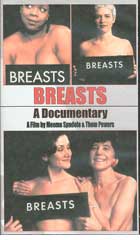
Breasts: A Documentary 1996
Distributed by First Run/Icarus Films, 32 Court St., 21st Floor, Brooklyn, NY 11201; 800-876-1710
Produced by Meema Spadola & Thom Powers
Directed by Meema Spadola & Thom Powers
VHS, color, 50 min.
College - Adult
Sociology, Physiology, Women's Studies
Date Entered: 01/07/2005
Reviewed by Beth A. Kattelman, Columbus Metropolitan Library, Columbus, OHThis documentary presents interviews with twenty-two women who frankly discuss their thoughts and feelings about their own breasts and about issues surrounding breasts in general. Most of the subjects are interviewed individually, sitting and talking to the interviewer in front of a blank background. Many are naked from the waist up. Interspersed with the interviews are clips from 50s hygiene films, bra advertisements, and beauty pageants. These provide an ironic and somewhat humorous counterpoint to the candid revelations and thoughts shared by the interviewees.
While the program takes breasts as its initial focus, the subject provides an opportunity for a much wider discussion of issues surrounding women’s body images and sexuality. Two particularly informative segments of the video are those dealing with breast implants and mastectomies. Several of the women discuss their breast implant operations, both failed and successful, and show the results. One woman who is a breast cancer survivor shows her mastectomy scar and her prosthesis. Her openness and positive attitude surrounding the surgery acts as a great support and validation for any other women who might be dealing with similar issues. These segments are also wonderful educational tools for viewers who may be uninformed about these issues.
Unfortunately, the program is somewhat narrow in its focus, in that it primarily presents the viewpoint of white, heterosexual women. There are a few women of color and one transgendered woman, but no lesbians are included in the interviews (or, at least none of the interviewees are identified as such.) The program could benefit from the inclusion of a wider array of women from various ethnic backgrounds and a broader view of sexuality.
The audio and video qualities are good except, of course, in the segments presenting clips from the 50s and 60s, which retain the poor quality of the originals. The program is appropriate for mature audiences due to the nudity and frank language it contains. It would be a useful addition to educational libraries, especially those connected with medical institutions or organizations that focus upon issues of human sexuality and women’s studies.
Awards
- 2002 Outstanding Achievement Award Winner, Society for the Scientific Study of Sexuality.
- Gold World Medal Winner, 1997 New York Festival.
- Director’s Citation Award Winner, 1997 Black Maria Film Festival.